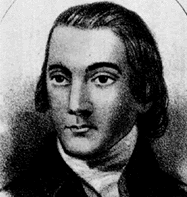Hall, Lyman

Lyman Hall was born in Wallingford, Connecticut in 1724. In 1747 he graduated from Yale, and returned home when he was twenty-three. He then went on to study with his uncle, the Reverend Samuel Hall, who trained him for the ministry. Between 1749 and 1751 he filled various pulpits. He was disappointed by the ministry though and began to study medicine. He returned to his home town in upon completion of these studies and started his own practice. In 1757 moved to Dorchester, South Carolina, and then to St. John's Parish in Georgia not long after.
Hall was deeply disturbed by Georgia's lack of involvement in the patriotic movement. For a time it looked as if Georgia wouldn't be able to participate in the convention at all, and St. John’s Parish made an initial effort to become a part of South Carolina. This plan did not work out, however, and St. John’s Parish decided to have its own convention in 1775, and sent Hall to Philadelphia, where he was admitted to as a nonvoting member of the Continental Congress. In July, Georgia finally decided to support the patriotic cause. Hall and four others were sent to the Congress as its delegates.
Hall began to practice medicine in Savannah once more in the early 1880's in an effort to improve his financial situation. He was also elected by St. John's Parish, with whom he had maintained connection, to the State Legislature. He became governor of Georgia in 1783. Later, he went on to serve as a judge in Chatham County's inferior court and also as a trustee of what later became the University of Georgia. Finally, in 1790 he moved near the Savannah River, to Shell Bluff Plantation. He died not long after, and was buried at the Signers' Monument in Augusta.
 >
>